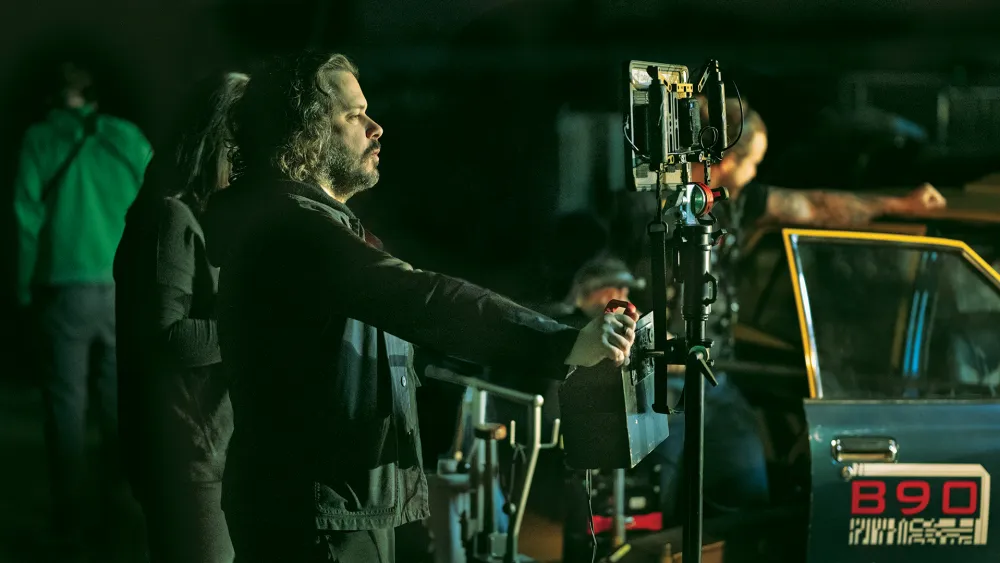Copyright Variety

Glen Powell, naked except for a towel, dangles from a rope eight stories in the air in below-freezing Bulgaria as director Edgar Wright watches from the ground in a parka, sipping an espresso. It’s February, and they’re sprinting toward the end of production on “The Running Man,” the longest, most expensive and by far coldest shoot of Wright’s career. Days earlier, a blizzard hit the country, blanketing it in snow. Powell, who stars as a game-show contestant in a race to stay alive in Wright’s adaptation of Stephen King’s dystopian novel, had been tracking the frigid weather closely, all too aware of this upcoming scene. In it, his character evades deadly hunters by jumping out a hotel window and then rappelling down the side of a building while wearing barely a stitch. “It’s always temporary pain for eternal cinematic glory,” Powell jokes. Wright, who built a cult following with quirky, genre-bending films — like “Hot Fuzz” and “Baby Driver” — that play like Tarantino on laughing gas, is meticulous about choreographing action sequences and obsessive about getting the perfect shot. His lens is tight on Powell, who hangs by a harness for 30 minutes while the camera resets. Wright, 51, wants to pay homage to the endurance tests Bruce Willis suffered through in “Die Hard” by taking John McClane’s barefoot skyscraper antics to the next level — and with fewer clothes. If Bulgaria sounds arctic, it was nothing compared with Scotland, where “The Running Man” also shot. “I think I lost circulation in my leg,” Wright says. “I had so many layers on, but it was the insidious cold of Glasgow. I wasn’t sure I’d ever get warm again.” Eight months later, Wright is relaxing in New York City on an unseasonably warm fall day. It’s five weeks before Paramount-distributed “The Running Man” opens on Nov. 14. Wright has just finished signing autographs and taking selfies with hundreds of New York Comic-Con fans who rushed the stage at the end of a panel about the movie. Comic-Con is pure costumed chaos, packed with cosplayers resembling the throngs of zombies in Wright’s “Shaun of the Dead.” That’s taking place upstairs. Wright is secluded from the mayhem in a quiet dressing room that can only be accessed via a labyrinth of tunnels — it’s fortified with enough pastries and bottled water to survive this nerd-pocalypse. King wrote the 1982 action-adventure long before social media took over the world and, in an ironic twist, set his send-up of reality culture and totalitarianism in 2025. What once seemed like a dark and distant fantasy now has eerie parallels with our tumultuous present. For Wright, the film is a chance to put his distinctive spin on a story that was adapted into a testosterone-soaked 1987 thriller starring Arnold Schwarzenegger at the height of his He-Man era. Wright’s version is set in a hellscape where the most popular show in America is “The Running Man,” a competition that offers $1 billion to any contestant who can survive a 30-day countrywide manhunt. There’s no prize for second place — only a grisly death. It’s a nightmarish premise that Wright grounds in humanity while still delivering his bravura action set-pieces. Part of the change comes from how the protagonist, Ben Richards, is portrayed. Instead of Schwarzenegger’s steroidal killing machine, Powell’s character is a hardscrabble father, so desperate to earn money for his sick kid that he risks his own life. “We were shooting in the elements all night,” Powell says. “Edgar wanted it to feel brutal.” Before signing up for the project, Powell assured Wright that he was ready for anything the filmmaker threw at him. “I said, ‘There’s not going to be an actor who works as hard for you as I will,’” Powell recalls. “‘I’ll put my body on the line to make sure you get the movie you want to get.” Wright, who grew up in southern England, the son of two artists, first read King in his teens, sharing paperback copies of “Night Shift,” “Salem’s Lot” and “It” with his brother, Oscar. To this day, he’s held on to his King collection, with its cracked spines and dog-eared pages. “It was a formative experience reading King, because it was my first time reading grown-up material,” he says. “It’s more than horror; there’s attitude, world-building and humor.” In 2017, Wright tweeted that if he could remake any movie, it would be “The Running Man.” Eight years later, he got his chance, but he doesn’t view his version as a remake of Paul Michael Glaser’s film; it hews closer to King’s dark novel. “That movie is its own thing,” Wright explains. “This is a new adaptation. ‘A Fistful of Dollars’ is an amazing reinterpretation of ‘Yojimbo.’ David Cronenberg’s ‘The Fly’ is a wildly different take on the ’50s film. It’s a fun thing because there’s two movies from the same source that are wildly different.” “Wildly different” describes a lot of Wright’s work since he burst on the scene with 2004’s “Shaun of the Dead,” a buddy comedy set during a George Romero-esque zombie outbreak. Stars Simon Pegg and Nick Frost became two of Wright’s closest friends, and the three went on to make two more cult favorites together — “Hot Fuzz” and “The World’s End.” Those movies sent up buddy-cop films and alien-invasion flicks by way of a distinctly British perspective (there were plenty of droll asides to go along with the action scenes). Wright quickly developed a fan base among a group of American pop culture-obsessed auteurs. “Peter Jackson, Quentin Tarantino and Sam Raimi saw themselves in Edgar,” Pegg says. “He was encyclopedic about film. That appealed to their own heritage.” As Wright’s stature rose, he became entrusted with bigger budgets from major studios. But his unorthodox sensibility didn’t always align with that of the entertainment industry. “Scott Pilgrim vs. the World,” an ambitious video game-inspired romantic comedy, earned raves, but its special effects-heavy sequences sent its price tag soaring to nearly $90 million. Audiences failed to show up, and the film grossed a measly $51.7 million. But Wright suffered an even more devastating setback, spending eight years developing an “Ant-Man” movie for Marvel, only to see the project collapse after his bespoke vision failed to jibe with Disney’s cookie-cutter superhero approach. He wanted to do something outrageous, but after “The Avengers” became a box office juggernaut, the studio opted to play it safe. “The idea of doing it at the time excited me, because you want to put your own spin on it,” he says. “But between pitching the idea and doing it, the whole franchise had blown up. There was a house style. The thing that attracted me about it had gone away.” “Baby Driver,” a 2017 sleeper hit about a socially awkward getaway driver, helped Wright regain his stride. The Sony Pictures release earned $227 million and proved Wright could retain his style while operating within a studio’s constraints. But he stumbled with “Last Night in Soho,” an homage to Swinging London and Polanski-esque horror films that had the misfortune of debuting in 2021, during the pandemic. “It was a bummer promoting that movie because it was all Zoom,” Wright says. “The pandemic was not a good time for anybody at all, and no good for cinemas either.” “The Running Man” marks Wright’s grand return to theaters with his most crowd-pleasing movie in years. Still, though King is a brand unto himself and Powell’s star is on the rise, with its $110 million budget “The Running Man” isn’t a sure thing. It arrives as many R-rated actionheavy movies aimed at adults — even those with big stars like Leonardo DiCaprio (“One Battle After Another”) or Robert Pattinson (“Mickey 17”) — are floundering at the box office. Not to mention that the film depicts fractured politics. Will audiences buy tickets for a movie set in a dystopia that mirrors their own? “We’re as close as can be to ‘Running Man’ without people actually dying,” Wright says. “I don’t even want to predict when things will take a darker turn. I hope never.” Much of Hollywood is freaking out that AI is coming for their jobs. It’s a subject that is front and center in “The Running Man,” which examines how the technology can be used to manipulate public opinion. Days before Wright took the stage at Comic-Con, the industry erupted over news that Tilly Norwood, an AI “actress,” had agents wanting her as a client. Her creators envision her as the next Scarlett Johansson. “Obviously, AI is here to stay,” Wright says. “There’s no putting the toothpaste back in the tube. But when you see that Tilly Norwood thing, who’s gonna get excited about an actress that doesn’t exist?” Bouncing his leg excitedly as he talks, Wright still hasn’t come down from the high of his “Running Man” panel and is full of energy despite having recently deplaned from a London red-eye. Being in New York has made him think back to his firstever Comic-Con in 2004, when he was promoting “Shaun of the Dead” with Pegg. “We could walk around with nobody having any idea who we were,” Wright says. Now, Wright has just headlined a panel packed with 3,000 fans. He’s clearly an icon to his fellow film geeks. The secret to Wright’s success is that deep down he’s still just a fan. That morning, Wright reached out to King and, in the most “polite and British” way, made sure he could tell the crowd that the author liked his take on “The Running Man.” “Like it? I love it!” King emailed back. “It’s faithful enough to the book to keep the fans happy, but different enough to make it exciting for me.” And as Wright reads the message, a grin breaks across his face. “I’ll take that,” he says.



